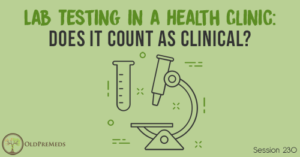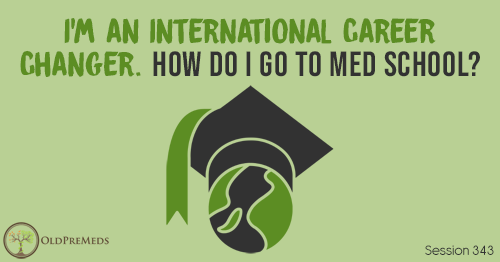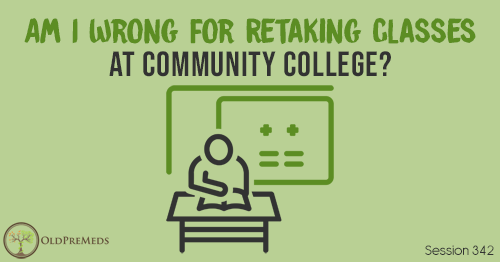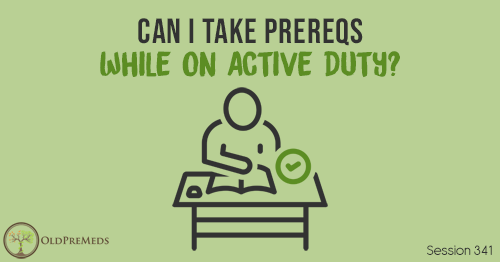Apple Podcasts | Google Podcasts

Session 230
Working in a lab at a free local health clinic, you assist providers by explaining tests and answering patients’ questions. Is it considered clinical experience?
Questions answered here on the podcast are taken directly from the Nontrad Premed Forum over at premedforums.com. Please go ahead and register for an account, ask your question, and have fun with the community.
Also, please be sure to check out all our other podcasts on Meded Media as we try to bring you as many resources as you need on this journey.
Listen to this podcast episode with the player above, or keep reading for the highlights and takeaway points.
[01:51] OldPreMeds Question of the Week
“I have an opportunity to volunteer at a local free health clinic working in the lab section. The lab section offers clients basic clinical laboratory tests and delivers results the same night of their appointment.
The clinical lab is not a research or academic lab and has limited client interaction (such as receiving samples, explaining the laboratory tests to clients, and answering questions about the laboratory tests being preformed). Lab volunteers work closely with the health care provider on shift.
The clinic’s laboratory services include: Urinalysis (dipstick and sediment), Gram stains, KOH digestions, Saline wet mount analysis, Rapid Strep A testing, Rapid pregnancy testing, Rapid HIV testing.
I need clinical experience. Should I go for this opportunity?”
[02:43] Distinguishing Clinical Experience vs. Volunteering vs. Shadowing
A lot of students get confused about this part of the journey. When you talk about clinical experience, one of the biggest questions that come up is they were doing paid clinical experience. But you don’t have to be paid for it to be a clinical experience.
There’s no right combination for paid versus clinical or paid versus volunteer clinical experience.
Usually, for the paid experiences, you need some training and certificates to be able to do those experiences.
Shadowing, on the other hand, is not a clinical experience. When you are entering in your activities in the application, shadowing is a separate entry. It’s a separate checkbox or a separate drop-down menu item when you are filling in your activities.
So you have paid clinical experience. You have non-paid clinical experience. And you have shadowing as a separate activity. Shadowing is different. It is passive. While clinical experience is typically more active.
[04:27] Limited Client Interaction
Our poster tells us that it’s a clinical lab and not a research or academic lab. That’s not the important part. They also said limited patient interaction. That tells me almost immediately that this is likely not going to be a clinical experience.
It doesn’t matter if it was a free health clinic or not a free health clinic. It doesn’t matter that it wasn’t a research lab and it doesn’t matter that it’s not an academic center. What matters is that patient interaction.
A lot of students may also ask about the position. Now there are some positions where maybe half of it is nonclinical, but half of it is.
“You can count the half that is clinical just don't over fleet your hours to count the nonclinical stuff as well. So be careful with that.”Click To Tweet[06:20] Go Look for that Experience!
If the student needs clinical experience, what I would definitely recommend is looking elsewhere for that experience, because this is not going to be a clinical experience.
'Clinical experience is interacting with the patients as much as possible.'Click To TweetNow, there are some weird caveats to this. Scribing is clinical experience, but there’s usually not a ton of patient interaction. It depends on the physician that you’re scribing for and the location that you’re scribing at. It depends on what that specific setup is like in each location to determine if there is any interaction or not.
[07:01] What Is Considered Clinical Experience? And What’s Not?
Scribing is considered a clinical experience. It’s not a ton of interaction. When you look at something like hospice where you’re just at someone’s home, sometimes interacting with them just hanging out with them just being there for them. That’s clinical experience.
Being a home health aide or caregiver to a family member. That’s also considered as clinical experience. It’s not a research center or an academic center. It’s taking care of someone who needs help. So that is clinical experience.
When you work as a pharmacy tech in a retail center, it’s a customer service driven, retail-driven environment. And what you’re doing is not clinical experience. You are potentially talking to the “patient” as they were walking up and telling you their name and you’re grabbing their meds.
If you’re thinking about pharmacy and deciding between being a pharmacist and becoming a physician, maybe that’s some good experience for you. But you need better and different clinical experience above and beyond that.
Now, if you’re in the lab. And the patients are coming back and you’re discussing the urine sample and what they need to do. You’re taking the urine sample and taking the blood and drawing the blood and having those interactions. That is much more likely going to be considered clinical experience.
“Be the judge for yourself.”Click To TweetIf you’re like an emergency room person that goes to the patient room and registers them into the electronic medical record, that’s not clinical experience. Sure, you’re interacting with the patient. But only for administration purposes.
Links:
Listen to Other Shows
[smart_podcast_player social=”true” social_twitter=”true” social_facebook=”true” social_gplus=”true” social_email=”true” ]
Leave us a Review and Rating!
Just like Yelp reviews or IMDB ratings help you choose your next restaurant or movie, leaving a 5 star rating and/or a written review is very valuable to the OldPreMeds Podcast. It allows us to be able to share our information with more people than ever before.
I am so incredibly thankful to those who have recently gone into our listing in iTunes to provide a five start rating and a written review of the OldPreMeds Podcast.
Subscribe and Download
iOS/Mac/Windows – You can subscribe to the show in iTunes. Or you could manually add the RSS feed to your aggregator.
Android/Mac/Windows – You can download DoubleTwist and use that to manage all of our past and future episodes
Please help us spread the word!
If you like the show, will you please take a moment to leave a comment on iTunes? This really helps us get the word out!











